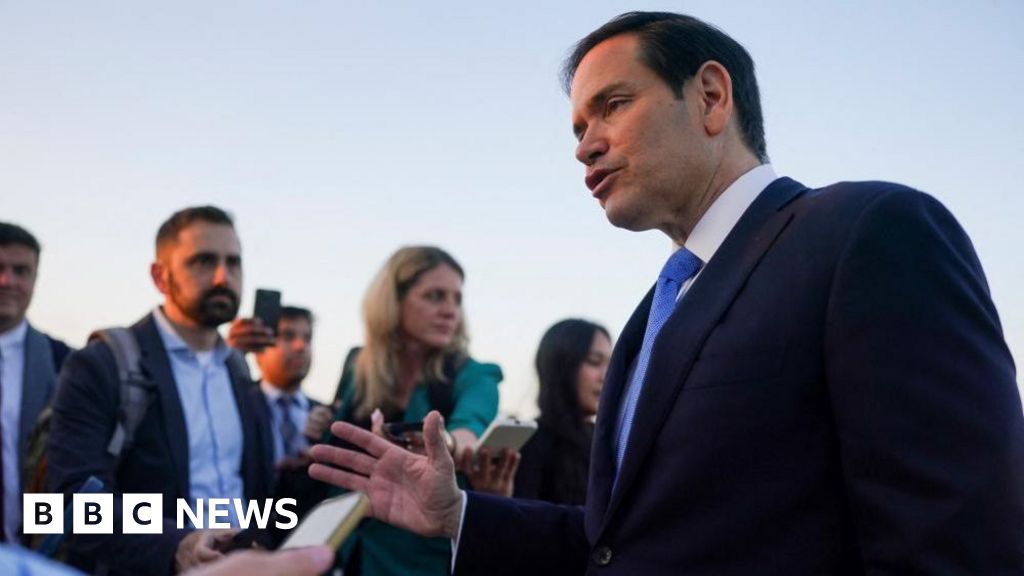
Marco Rubio inaugurates Israeli settler-led archaeological site

Marco Rubio Inaugurates Controversial Archaeological Site in East Jerusalem
A High-Profile Event
US Secretary of State Marco Rubio recently inaugurated a contentious archaeological site in East Jerusalem, an area that has been a focal point of Israeli-Palestinian tensions. The site, known as the “Pilgrimage Road,” is an underground tunnel excavated by an Israeli settler organization and runs beneath Palestinian homes adjacent to the Old City of Jerusalem. Rubio’s attendance at the opening ceremony has drawn significant criticism, particularly from Palestinian rights groups, who argue that it symbolizes US endorsement of Israel’s settlement policies in a region that holds profound religious significance for multiple faiths.
The Significance of the Site
The opening ceremony took place at the City of David, a biblical tourism site managed by the Elad settler organization in the predominantly Palestinian neighborhood of Silwan. Rubio characterized the excavation as “perhaps one of the most important archaeological sites on the planet,” emphasizing its significance to many Americans. He acknowledged the political dimensions of the event but insisted that the archaeological value of the site should take precedence.
The Pilgrimage Road is believed to have once served as a thoroughfare for pilgrims during the Roman era, leading to what is revered by Jews as the location of the two Biblical temples. The tunnel reportedly stretches approximately 600 meters, running beneath Palestinian homes and the Old City walls, and ends near the Western Wall, which is part of the compound that contains the al-Aqsa Mosque, known to Muslims as Haram al-Sharif.
Local Reactions
The inauguration has sparked outrage among local Palestinian residents and rights advocates. Fakhri Abu Diab, a 63-year-old resident of Silwan, expressed his dismay, stating that Rubio’s visit appears to align him with extremist elements within the Israeli government rather than supporting international law and Palestinian rights. Abu Diab highlighted the ongoing struggles faced by residents, including home demolitions and eviction orders that have plagued their community for years. He lamented the lack of attention to the suffering of Palestinians, particularly as he stood next to the remnants of his home, which was demolished last year under orders from Israeli authorities.
According to Abu Diab, the Israeli government justifies these demolitions by claiming that the homes were built without permits. However, obtaining such permits is nearly impossible for Palestinians, further complicating their situation.
The Role of Elad
The City of David has been operated by Elad since the early 2000s. This settler organization has been accused of appropriating land, acquiring Palestinian homes, and advocating for the eviction of Palestinian families in Silwan. A report released in July by the UN’s Independent International Commission of Inquiry on the Occupied Palestinian Territory highlighted these actions, underscoring the ongoing displacement of Palestinian residents in the area.
Ze’ev Orenstein, who serves as the director of international affairs at the City of David, defended the archaeological work, stating that all excavations are conducted by the Israel Antiquities Authority in accordance with the highest standards. However, he declined to provide further comments regarding the political implications of the site or the concerns raised by Palestinian rights groups.
Implications and Concerns
The inauguration of the Pilgrimage Road has been interpreted by some as an affirmation of Israeli sovereignty over a highly sensitive area of Jerusalem, which is sacred to multiple faiths. The Israeli campaign group Peace Now responded to Rubio’s visit by labeling it as “nothing less than American recognition of Israeli sovereignty over the most sensitive part of Jerusalem’s Holy Basin.” They expressed concern that the event undermines the city’s status as a shared religious space and contributes to the ongoing conflict between Israelis and Palestinians.
The opening of this site is emblematic of broader tensions surrounding archaeological practices in the region, where excavations often intersect with political and social issues. As archaeological projects continue to be a source of contention, the balance between preserving historical heritage and respecting the rights and histories of local communities remains a complex challenge.
Conclusion
Marco Rubio’s inauguration of the Israeli settler-led archaeological site in East Jerusalem has sparked significant debate and criticism, particularly from Palestinian rights advocates who view the event as an endorsement of Israel’s settlement policies. The ongoing struggles of residents in Silwan, coupled with the historical and religious significance of the area, highlight the complexities surrounding the Israeli-Palestinian conflict. As the situation evolves, the implications of such events will continue to resonate within both local and international contexts.
Key Facts
– **Event**: Marco Rubio inaugurated the “Pilgrimage Road,” an archaeological site in East Jerusalem.
– **Location**: The site is operated by the Elad settler organization in the Palestinian neighborhood of Silwan.
– **Criticism**: Palestinian rights groups condemned Rubio’s presence as support for Israeli settlement policies.
– **Local Impact**: Residents face ongoing home demolitions and eviction orders related to the expansion of settlements.
– **Historical Context**: The tunnel is believed to have been a route for Roman-era pilgrims, ending near the Western Wall.
Source: www.bbc.com
